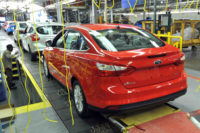In April, Ford Motor Co. announced that it would stop selling the Taurus, Fusion, Fiesta and C-Max passenger cars, leaving only the Mustang to be sold in North America.
The announcement comes on the heels of General Motors’ announcement last fall that it would discontinue production of the Chevrolet Volt, Cruze and Impala; the Cadillac XTS and CT6; and the Buick LaCrosse. And it follows Fiat Chrysler’s decision back in 2016 to discontinue the Dodge Dart and Chrysler 200.
I can’t fault the Detroit Three for setting aside passenger cars to focus on pickups and SUVs. Clearly, the North American market has changed. Passenger cars represented barely a third of the market last year. Just 10 years earlier, cars comprised half the market. Of the top 10 best-selling vehicle models in 2018, seven were pickups, crossovers or SUVs. Collectively, sales of the three passenger cars on the list—the Toyota Camry, Honda Civic and Honda Accord—were down nearly 12 percent. All by itself, the No. 1 selling vehicle in 2018, the Ford F-Series pickup, nearly outsold the Camry, Civic and Accord combined: 909,330 to 960,270.
According to consulting firm LMC Automotive, approximately 84 percent of the vehicles GM sells in the U.S. in 2022 will be trucks or SUVs. That ratio increases to 90 percent for Ford and 97 percent for Fiat Chrysler.
Thinking about the Detroit Three’s strategy, a number of business aphorisms come to mind, like “Give the people what they want” or “Focus on what you do best.” However, the contrarian in me might also add, “Don’t give up without a fight!”
As a businessman, I hate conceding a market to anyone. I worry that offering mostly trucks and SUVs could drive consumers further into the hands of competitors if and when consumer preferences change. Looking at the list of 2018 best-selling vehicles again, it’s worth noting that Toyota, Honda and Nissan can claim six of the top 10 and 10 of the top 20. Collectively, Toyota outsold FCA by nearly 200,000 units last year, and it very nearly outsold Ford, too. So it’s not as if the Detroit Three are running away with the show.
Certainly, their competition is not conceding the truck and SUV market. Of the top 10 best-selling trucks and SUVs, four are made by Toyota, Honda and Nissan.
I’m also old enough to remember the oil crisis of 1973. Gasoline prices won’t always be as low as they are now. (If you call a national average of $2.67 per gallon low.) Gas prices have spiked in the past (as they did after the Iranian Revolution in 1979 or the Great Recession in 2008), and they will again. Will the Detroit Three be ready with alternatives to gas guzzlers?




